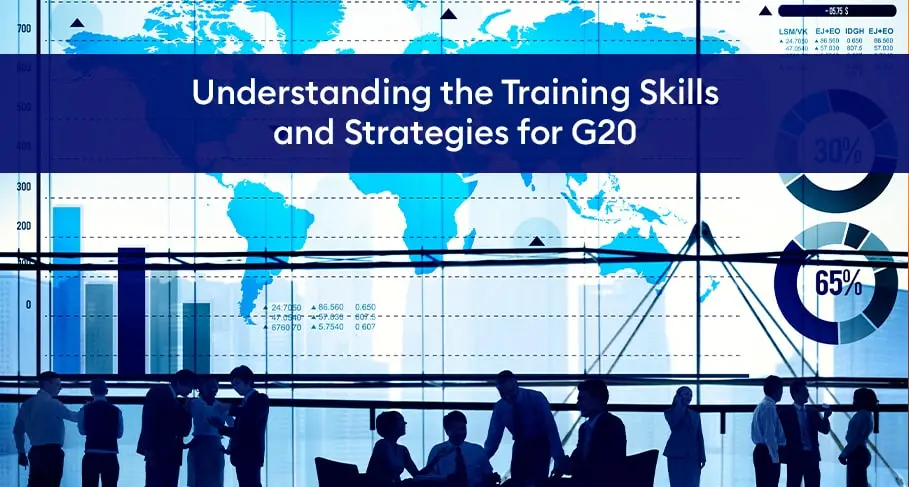Across multiple G20 summits, notable commitments related to skills development have been made. Currently, India is leading the G20 Summit 2023 while facing a global skill development challenge caused by conflicting factors due to reduced globalization. The amalgamation of technical breakthroughs, shifts in energy use, and shifting demographics have created a crucial societal dilemma – How to equip individuals with the necessary abilities to engage effectively in the global economic arena?
The Future of Jobs Report 2023 underscores the dynamics of work displacement, indicating that technological adoption will promote job growth and displacement. Investments in the green transition and ESG standards have the potential to create new jobs, but they may also result in partial employment displacement. Supply chain localization has the potential for both growth and displacement. While new technologies such as AI and big data will stimulate job development in various industries, they will also cause displacement. Clerical and administrative job opportunities are predicted to decline, and this contrasts with AI’s potential for rapid job turnover despite its gradual implementation. Ultimately, targeted upskilling and government assistance are critical in navigating these changing labour problems.
Another study conducted by Korn Ferry projects that by 2030, the world could experience a shortage of skilled talent exceeding 85 million, a number equivalent to Germany’s population.
In addressing these impending challenges, the creation of a global skills alliance has the ability to approach and solve this problem efficiently.
Before we proceed, let’s understand the need for skills development:
Why is skill development crucial?
Given the rapid pace of global change and evolving employment requirements, investing in skills development has become critical to equip workers with the abilities required to flourish in the twenty-first-century economy.
Skills training can assist them in the following ways:
- Remain competitive in the job market: As the skills required for work evolve, workers who have not upskilled or reskilled may find themselves at a disadvantage in the labour market.
- Improve earning potential: Skilled workers typically get better wages.
- Improve careers: Skill development can help employees advance into more demanding and well-paying positions.
- Become more productive: Skilled workers are more likely to be productive and contribute to the economy.
- Becoming more adaptable to change: Workers who can upskill and reskill are more likely to be able to adjust to changes.
What are G20’s strategies for skill development in 2023?
In 2023, at the G20 Summit India will concentrate its efforts on skill training in three major areas:
- Improved access to high-quality education and training: The G20 will guarantee that all individuals, regardless of origin or circumstances, have access to high-quality education and training. Making early childhood education more inexpensive and accessible, expanding access to vocational education and training, and offering chances for lifelong learning for people of all ages are all part of this.
- Connecting skills to jobs: The G20 will endeavour to improve matching skills to jobs by increasing the collection and analysis of labour market data. This will assist governments and businesses in identifying skill gaps and developing training programmes that suit labour market demands.
- Promoting lifelong learning: Lifelong learning will be boosted by the G20 by making it more straightforward for people to upskill and reskill throughout their careers. This encompasses financial support for training, enhancing the adaptability and availability of training programs, and nurturing a mindset of continuous learning throughout one’s life.
How will the G20 implement its skills training strategy for 2023?
The G20 will execute its skills training regimes in a variety of ways, including:
- International cooperation: The G20 will cooperate with other international institutions, such as the World Bank and the International Labour Organization, to share best practices and establish new projects.
- Partnerships between the public and private sectors: The G20 will collaborate with businesses and other public and private entities to develop and deliver training programmes.
- Investing in education and training: The G20 will pledge to support education and training at home and abroad.
- Legislative reform: The G20 will endeavour to modify laws and regulations to make it simpler for personnel to access training and skilling opportunities. Needless to mention, the G20’s skills training strategies for 2023 are ambitious, but they are necessary to ensure that the world’s workforce is ready for the challenges and opportunities of the twenty-first-century economy. Also, the willingness of governments, businesses, and individuals to collaborate to ensure that everyone can upskill and reskill will determine the success of these programmes. In addition to the aforesaid, the G20 can adopt the following strategies as well:
- Develop a national skills strategy: Each country should create a national skills strategy that identifies the economy’s skilling needs and develop a plan to address those needs.
- Financial assistance for training: Governments should provide financial aid for training, such as scholarships and grants.
- Make training more flexible: Training programs like online and part-time training should be more adaptable and accessible.
- Promote a lifelong learning culture: Governments and businesses should foster a culture of lifelong learning in which everyone is encouraged to upskill and reskill throughout their careers.
By implementing these measures, the G20 can ensure that all individuals possess the skills they need to flourish in the twenty-first-century economy.
Also read, G20 Summit and India: Priortising Education Technology for Holistic Growth
